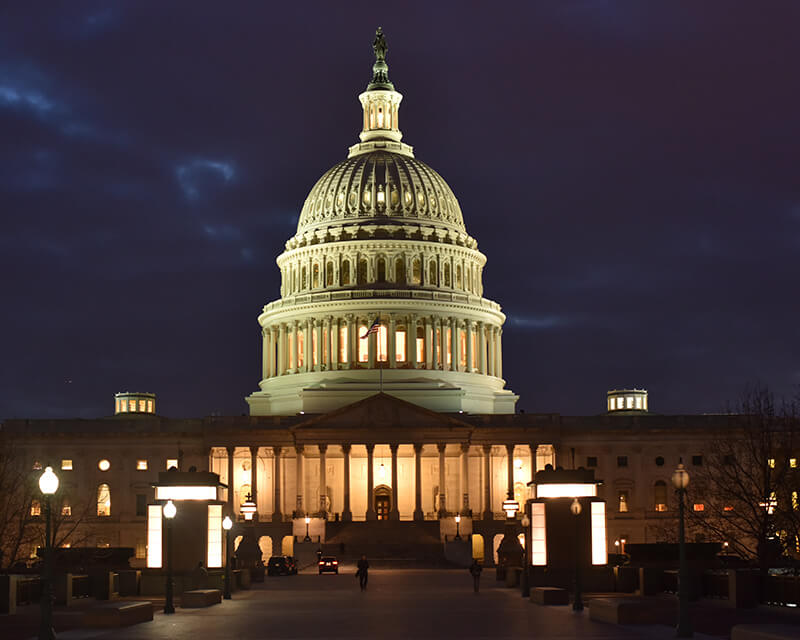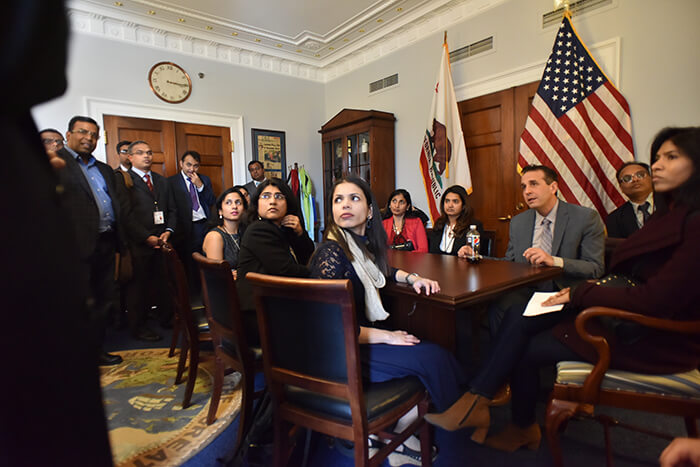Without increasing immigration, the “Fairness for High-Skilled Immigrants Act” is a simple technical fix to a longstanding issue that contributes to large backlogs in the employment-based Green Card system and negatively impacts the U.S. economy.
Because United States immigration policies enforce a general shortage of employment-based Green Cards, all employment-based applicants face some delay in securing permanent visas. The problem is exacerbated by an arbitrary cap of 7% on immigration from any single country. Because of this many, equally qualified employment-based Green Card applicants from large countries must wait far longer than applicants from other parts of the world—many decades for individuals from India compared with a few short years for applicants from Egypt. For those on temporary visas, like H-1B, this wait comes at a tremendous personal and economic cost.
Even though they live and work in America, employment-based applicants caught in the per country backlog experience significant quality of life issues:

Cannot become entrepreneurs and start new businesses that create new American jobs
- Cannot accept promotions from their employers without starting over in the green card line
Cannot change employers without starting over in the Green Card line
Cannot visit loved ones in home countries without risking being held upon their return to the United States
Must secure student visas for their children turning 18 or face their forced deportation, despite years of paying taxes into local and state educational systems
Under today’s 7% cap, large countries like India and China, which account for over 40% of the world’s population and an even higher percentage of the highly skilled global workforce, receive the same number of visas as Greenland, a country that accounts for 0.001% of the world’s population. As a result, immigrants from large countries, who share equal qualifications with any other highly skilled worker entering the US, must wait 20 to 30 times longer for permanent residence. This creates an economically unhealthy reliance on temporary visas and costs the US economy highly skilled workers who simply give up and leave the US.
The “Fairness for High-Skilled Immigrants Act” would correct this problem by first clearing backlogs and then creating a system where all equally qualified highly skilled workers, no matter their country of birth, will receive green cards in the order they apply and based solely on the skills they bring to America. Skilled immigrants from any other country in the world currently in line will NOT be adversely impacted by the bill.
Simple Facts about the bill
Fairness for High-Skilled Immigrants Act does not increase immigration to America by a single new visa.
It almost exclusively benefits those high-skilled foreign workers already living in America, adding value to our economy through innovation and job creation, and raising their children as Americans.
This bill will reduce the wait times for large country applicants from 70+ years to 5 years. For those who get a Green Card with minimal wait times today because of where they were born, it only increases wait times from 2.5 years to 5 years.
It will help increase labor market efficiencies by allowing large numbers of backlogged workers to move off temporary visas decades sooner than they do currently.
Fairness for High-Skilled Immigrants Act reflects our American values. Skilled workers in America should be welcomed for their talents, not punished for where they were born.

To know more about this bill, listen to this recording of a spirited debate between Leon Fresco (Strategist for Immigration Voice) and Jessica Vaughn (Center of Immigration Studies). Recorded in November 2018, the debate was moderated by the McClatchy Group’s Bill Douglas and Franco Ordoñez. At the time of this recording, this bill was H.R.392 and had been co-sponsored by 75% of the House, plus almost 20 bi-partisan Senators.
Background on the Fairness for
High-Skilled Immigrants Act
Bipartisan immigration reform: Everyone agrees that eliminating per-country limits
on employment-based Green Cards is a good idea!
Per-country Limits
The employment-based Green Card system is completely broken due to excessive delays and backlogs in processing the petitions of nearly 1.5 million highly skilled workers (plus their families) who are certified by the US government as doing jobs that no US citizen or Green Card-holder is willing, qualified or able to do. The delays in obtaining permanent residency are primarily due to a single reason: per-country caps on employment-based Green Cards.
No per-country limits on any of the non-immigrant visas that precede green cards
When foreign workers are hired to work in the US, the employer is required to petition the US government for permission to hire this foreign worker. Following a complicated legal process that involves multiple federal agencies such as the Department of Labor (DOL) and US Citizenship and Immigration Services (USCIS), the foreign worker is granted a temporary non-immigrant visa such as H-1B, L-1, J-1, etc. These temporary non-immigrant visas allow foreign workers to live in the US for the duration of the visa but do not grant them lawful permanent residency of the US. For lawful permanent residency, foreign workers require an employment-based Green Card. Unlike the employment-based green card system, there are no per-country limits on any of the non-immigrant visas (H-1B, L-1, J-1, etc.), that feed into the employment-based Green Card system. Foreign workers are hired based on their skill but their permanent residency is based on their country of birth.
Discriminatory immigration system legalizes indentured servitude
It is discriminatory to have laws that subject immigrants from four (4) nations: India, China, Mexico, and the Philippines – to multi-decade waits for Green Cards. When they are not allowed to change jobs while waiting, the system is mandating indentured servitude.
Immigrants and native workers are both victims of a broken legal immigration system
The broken immigration system ensures that specific immigrant workers find it difficult to change jobs. It also ensures that the same workers have fewer rights – ranging from inability to negotiate better wages to better working conditions- out of fear of losing the jobs on which their lives in the United States are based. In a society where some workers have fewer rights, workers with more rights are disadvantaged in the job market. Currently, we have a marketplace where immigrant workers with fewer rights are exploited, whereas workers with more rights (US Citizens and Permanent Residents) will either not land a job or will be gradually replaced by workers with fewer rights. And that is the core issue in instances of visa abuse in companies like Disney, Southern California Edison, and GE, etc.
The system without per-country limits on Green Cards
With the elimination of per-country limits, no immigrant’s Green Card petition is given preferential treatment. Instead, all applicants will be treated equally, regardless of the country where they were born.
